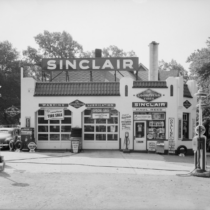News Stories

Thousands of Ann Arbor Photos
Historical photos of Ann Arbor and surrounding communities are now available digitally as part of the Bentley Historical Library’s contribution to the Ann Arbor Bicentennial.
Mel Ivory, co-founder of Ivory Photo Engraving Company, began his photography career doing photo finishing at both his father’s and his uncle’s drug stores. This early work led him into a career in photography that began in the mid-1920s when he was an undergraduate at the University of Michigan. Many of his earliest photographs capture the University of Michigan campus and life in Ann Arbor in the 1920s and 1930s.
After graduating, Mel continued his photo finishing work and began providing photography services to the local community and his work continued into the 1970s. Ten years later, the Bentley Historical Library acquired Mel Ivory’s extensive collection of photographic negatives documenting the built environment, local businesses, and community life in Washtenaw County in the middle of the 20th century.
As Ann Arbor celebrates its bicentennial this year, the Bentley Library wanted to make the Ivory Photo collection available online, to the entire community. Staff worked to prepare more than 10,000 photo negatives for digitization, many of which were delicate and even combustible due to a nitrate component, and therefore required special handling.
The first batch of 2,700 images, comprising mostly photos of Ann Arbor, is now available. The Bentley Library is grateful for its partners at U-M Library, who are hosting the images on their digital collections platform.
The remaining photos from the collection will be available sometime in early 2025.
“My hope is that access to these images supports community commemorations, individual recollections, and spurs the creativity of the entire Ann Arbor community as it reflects on its history,” says Alexis Antracoli, Director of the Bentley Historical Library.
Among the highlights of the Ann Arborportion of the collection are photos of the World War II era, images of local businesses that may or may not still exist, and depictions of people participating in community and campus events. More of Ivory’s original descriptions were extracted during the digitization process, meaning many of the images can now be searched using street address, organization name, building name, and more.
“The Ivory Photo digitization project is one among what we hope will be many efforts that focus on community engagement,” says Antracoli. “We are pleased to be able to help celebrate Ann Arbor in this way, and we look forward to more community partnerships of this kind.”








